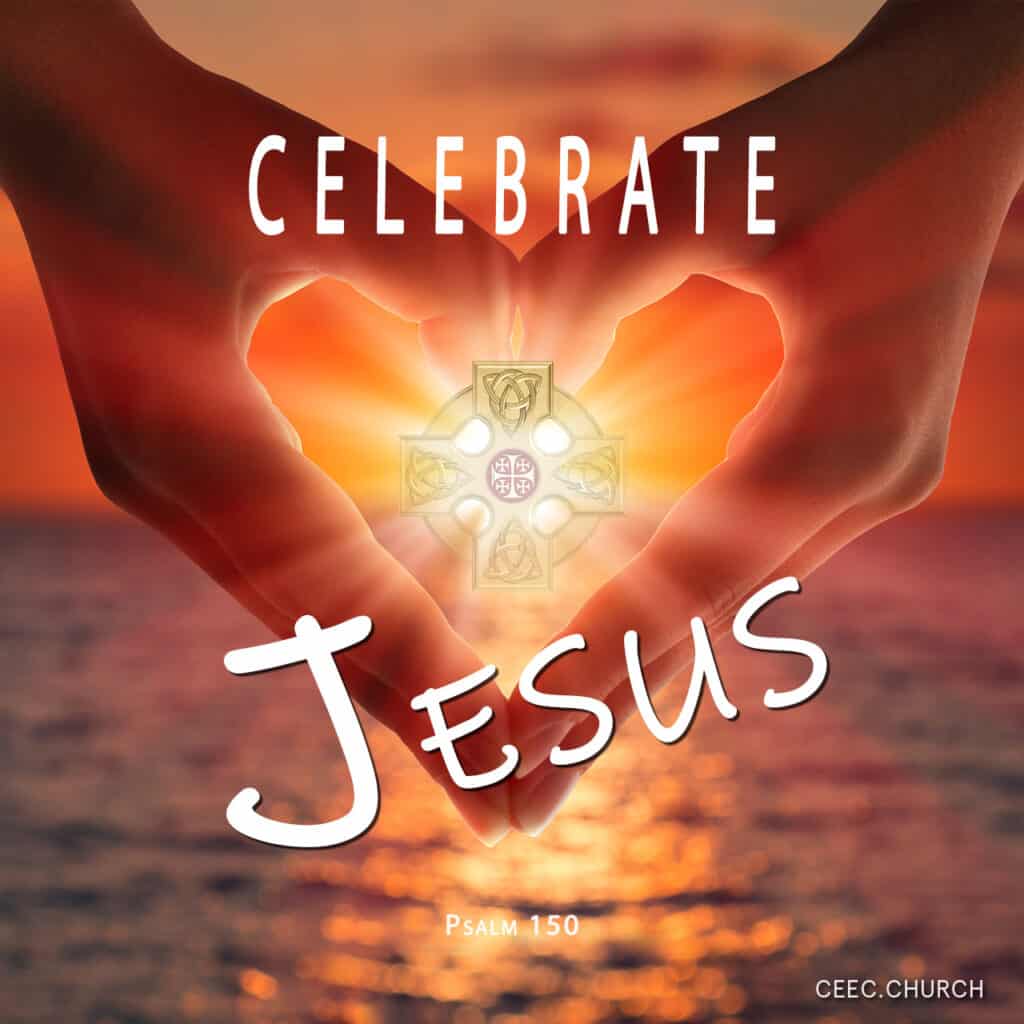Everyone loves a good party. Getting together with friends old and new to celebrate some occasion — YEAH, lots of fun. We’re having a party – and YOU are invited.
What’s not to like about a great party? Friends gathering together to celebrate some milestone like a birthday or anniversary, or perhaps an accomplishment like a graduation. Often there are even a few new people to meet. And there’s always food! There’s just something about a meal with family and friends that can’t be beat, in my book.
Today’s verse says PRAISE THE LORD! PRAISE GOD IN HIS SANCTUARY. PRAISE HIM FOR HIS MIGHTY DEEDS.
In other words – CELEBRATE !!!! Let’s get together and rejoice in who God is, who we are in Him and all that He has done.
The early church often combined a communal meal, a time of teaching and the celebration of the Eucharist. The ultimate party. Friends gathering together to celebrate an anniversary. “Do this in remembrance of Me.” Week after week gathered together to celebrate the great love that Jesus had demonstrated. It was the defining meeting of the people of God. This morning I want to fill you in on how the early church worshipped God, because HOW God is worshipped is important.
The shape of the liturgy was established early in the history of Christ’s new community, and has remained relatively unchanged except for the recent changes in protestant churches after the Reformation. Worship as designed by God is liturgical; that is, it is the “work of the people.” This is the biblical and apostolic standard. It involves the participation of all the people, as opposed to spectator worship or worship as theater. The liturgy, always conforming to the apostolic shape, is free, open, participatory, Spirit-filled. It involves the spirit, the soul, and the body. Our worship in the CEEC is characterized by both liturgy and liberty.
So our celebrations can take multiple expressions, but always withing the “shape” of the liturgy. What does that mean? Simply it means that all three streams of historic church ought to be evident, so they reflect the nature and character of the apostolic structure of worship. Do not think this is restrictive. It is sort of like telling people, “When you drive you must stay on your side of the road, pay attention to traffic, and not exceed the speed limit.” It doesn’t restrict where you travel, it simply provides a structure that makes every trip safe and beneficial to the largest group of people.
In the Continuing Evangelical Episcopal Communion, this means that every worship service will begin with a deliberate gathering unto the Lord; a dedication of the worship service unto Him and His glory. As we do we sincerely consider and publicly repent from our sin. Having been cleansed by His grace, we enter into a time of worship, giving Him the glory due His name We will always read from and be instructed by His word. The principal weekly gathering (or “gatherings,” for churches with more than one service) will always include a celebration of the Eucharist.
I find it fascinating that many churches today celebrate the Eucharist so infrequently when compared to the historic church. Once a month. Once a quarter. Even once a year. Franky, I don’t get it.
Also, the “logic” behind the choice is quite comical. Well, at least from my perspective. Many churches today place a great emphasis on either worship or teaching. Of course, I’m NOT advocating getting rid of either of these; I’m just observing that the foolishness of their reasoning would never be accepted if it were applied to either of these two pillars of worship.
Can you imaging a church or pastor saying, “We only teach from the Bible once a month here. If we were to do it every week, it may become ‘routine’ and not truly appreciated.” Absurd!
When the church gathers for worship, it is to celebrate the love of Christ and to enjoy the closest possible intimacy with Him. It is to be a celebration of His love. TRUE LOVE IS NEVER ROUTINE, even if it involves routines.
I kiss my wife several times a day. If you are married, I hope you do, too. If that EVER becomes “routine” the problem is not that you are “doing it too regularly.” The problem is to be found in the root relationship. Only when your relationship is suffering does an expression of love lose its importance. Fix the relationship, enjoy the expressions of intimacy. This applies to our relationship with Christ as well. This applies to Eucharist, worship and His word.
So – Let’s PARTY!!!! Let’s CELEBRATE because of His love. His love gift to us was one of total commitment, absolute surrender, and unrestricted love. He Himself likens it to a marriage. We are called the Bride of Christ.
CELEBRATE !!!!!!!
The psalmist says PRAISE THE LORD! PRAISE GOD IN HIS SANCTUARY. PRAISE HIM FOR HIS MIGHTY DEEDS.
We’re inviting YOU to the party.
